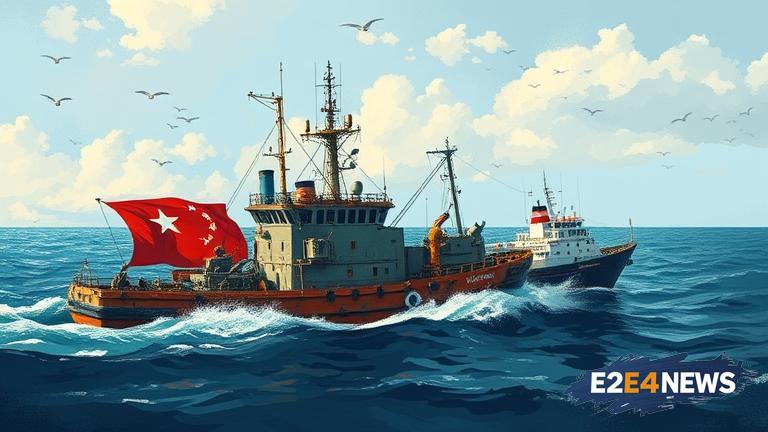The Chinese maritime militia has been a topic of increasing concern in recent years, with its activities in the South China Sea and beyond raising questions about the country’s intentions and the impact on the global maritime environment. The maritime militia is a paramilitary force that operates under the guise of civilian fishing vessels, but is actually controlled by the Chinese military. This force has been involved in a range of activities, including IUU fishing, which is a major threat to the sustainability of the world’s oceans. IUU fishing refers to fishing activities that are not reported, or are reported inaccurately, and which may be conducted in contravention of national or international laws. The Chinese maritime militia has been accused of engaging in IUU fishing in a number of regions, including the South China Sea, the Indian Ocean, and the Pacific Ocean. This has led to tensions with other countries, including the United States, which has accused China of failing to take adequate steps to prevent IUU fishing. The Chinese government has denied these allegations, but the evidence suggests that the maritime militia is playing a significant role in IUU fishing activities. The impact of IUU fishing is not limited to the environment, but also has significant economic and social implications. IUU fishing can lead to the depletion of fish stocks, which can have a major impact on the livelihoods of communities that depend on fishing. It can also lead to the loss of revenue for governments, as well as the undermining of efforts to manage fisheries sustainably. The Chinese maritime militia’s involvement in IUU fishing is also a concern for regional security, as it can be used as a means of asserting Chinese control over disputed territories. The militia’s activities have been linked to a number of incidents, including the ramming of Vietnamese fishing vessels and the harassment of Philippine fishermen. The international community has called on China to take steps to prevent IUU fishing and to ensure that its maritime militia is not involved in such activities. However, the Chinese government has been slow to respond, and the problem persists. The United States has taken steps to address the issue, including the imposition of sanctions on Chinese companies involved in IUU fishing. However, more needs to be done to address the scale and complexity of the problem. The Chinese maritime militia’s involvement in IUU fishing is a symptom of a broader problem, which is the lack of effective governance and regulation of the world’s oceans. The international community needs to work together to develop and implement more effective measures to prevent IUU fishing and to ensure that the world’s oceans are managed sustainably. This will require a coordinated effort, involving governments, industry, and civil society. It will also require the development of new technologies and approaches, such as the use of satellite monitoring and artificial intelligence to track and prevent IUU fishing. The Chinese maritime militia’s activities are not limited to IUU fishing, but also include other forms of maritime coercion, such as the use of civilian vessels to block access to disputed territories. The militia’s activities have been linked to a number of incidents, including the blockade of the Scarborough Shoal, a disputed territory in the South China Sea. The international community has condemned these activities, and has called on China to respect the rights of other countries to freedom of navigation and overflight. The Chinese government has denied that its maritime militia is involved in such activities, but the evidence suggests that the militia is playing a significant role in China’s maritime strategy. The Chinese maritime militia’s activities are a major concern for regional security, and have significant implications for the stability of the Asia-Pacific region. The international community needs to work together to address the challenge posed by the Chinese maritime militia, and to ensure that the world’s oceans are managed sustainably and securely. This will require a coordinated effort, involving governments, industry, and civil society. It will also require the development of new technologies and approaches, such as the use of satellite monitoring and artificial intelligence to track and prevent IUU fishing and other forms of maritime coercion. The Chinese maritime militia’s involvement in IUU fishing and other forms of maritime coercion is a symptom of a broader problem, which is the lack of effective governance and regulation of the world’s oceans. The international community needs to work together to develop and implement more effective measures to prevent IUU fishing and to ensure that the world’s oceans are managed sustainably. This will require a coordinated effort, involving governments, industry, and civil society. It will also require the development of new technologies and approaches, such as the use of satellite monitoring and artificial intelligence to track and prevent IUU fishing and other forms of maritime coercion. The Chinese government has taken some steps to address the issue of IUU fishing, including the establishment of a new fisheries management system. However, more needs to be done to address the scale and complexity of the problem. The international community needs to work together to develop and implement more effective measures to prevent IUU fishing and to ensure that the world’s oceans are managed sustainably. The Chinese maritime militia’s activities are a major concern for regional security, and have significant implications for the stability of the Asia-Pacific region. The international community needs to work together to address the challenge posed by the Chinese maritime militia, and to ensure that the world’s oceans are managed sustainably and securely.
